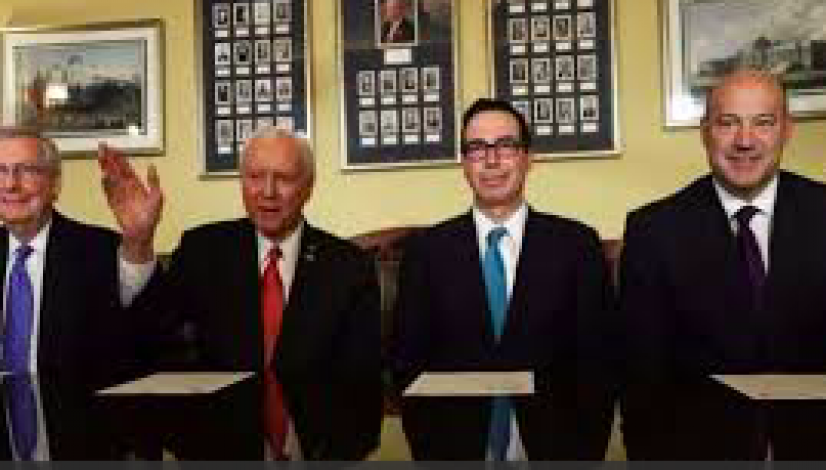Pockmarked tax reform bills move us in right direction

There’s an old Wall Street adage: Buy on the rumor, sell on the news. That’s what’s happening with tax reform.
The prospect of tax cuts across the board — especially for corporations — helped drive the Dow Jones to 74 new highs since the election. The revelation of what the tax bill might actually look like is letting some of the air out of the balloon.
Guess what? Tax reform isn’t easy. If it were, Democrats would have done it. That’s not just a dig at the party of House Minority Leader Nancy Pelosi (D-Calif.) and Senate Minority Leader Charles Schumer (D-N.Y.). That’s a fact.
For years, it has been clear that our approach to taxing the overseas income of multinationals was dysfunctional and that our tax rate for big businesses was out of step with our manufacturing and trade rivals.
There was also widespread consensus that a re-write for small companies that file as individuals was long overdue. In addition, most people agreed that the overall tax code, weighing in at over 70,000 pages, begged for simplification.
Somehow, though, even though party leaders like Bill Clinton and Barack Obama advocated for change, tax reform never climbed to the top of the Democrats’ agenda.
Enter the GOP, which campaigned on tax reform and is now pushing it through. The bills introduced by the House and the Senate are messy and in some ways disappointing, but they will move us along the spectrum toward more sensible tax policy. That said, a lot of us will not be celebrating. But then, this is not a perfect world.
In a perfect world, everyone would get a tax cut.
In a perfect world, Sen. John McCain (R-Ariz.) would not have blown up GOP efforts to repeal all of ObamaCare’s taxes and fees. Had those revenues been stripped away, pushing tax reform through reconciliation would have been much, much easier.
In a perfect world, the nation’s best interests would dictate tax policy, not politics. Democrats would have joined in the crafting of the bill, instead of declaring Republican efforts dead on arrival.
In a perfect world, money would not talk quite so loudly. For example, that enduring cockroach of tax breaks — the carried interest loophole — which begins to look like it might survive a nuclear holocaust, would disappear.
But this is not a perfect world. The tax writers have to find revenues to offset the lowered corporate and individual rates, and every new revenue source is a hit to someone’s pocketbook.
There is much good to be said about the GOP tax bills, and there is some bad. The best of both bills is the slashing of what Bill Clinton rightly called our “uncompetitive” corporate tax rate.
Unlike the House bill, the Senate version postpones implementation of the new 20 percent rate until 2019. That is a stupid idea that could well cause businesses to postpone investment and hiring for a year. The White House doesn’t like it; neither do investors. We hope the Senate ditches that one.
Both the House and Senate versions adopt the so-called territorial system for taxing corporate income earned overseas, correcting our near-unique and problematic approach. Both, with minor differences, also set up a reasonable method for encouraging repatriation of cash that has been stockpiled abroad; that is a good thing.
Individuals will mostly pay taxes at a lower rate, and many will benefit from the doubling of the standard deduction. It is baffling that the Senate version insists on seven brackets while the House bill manages to converge on four. Lawmakers should replay videos of President Trump’s tax reform promises; the crowds went wild for simplicity.
It is also cheering that the House provided an amendment that countered criticism (from the National Federation of Independent Businesses, among others) that small business owners were left behind in their original bill. To provide a lift to only our largest corporations, and not to entrepreneurs, would be foolish.
Which bring us to a criticism lodged by James Stewart in an op-ed published in the New York Times. Stewart observes that the tax bills favor the investor class at the expense of people with high incomes “generated primarily by their own labor or services.”
The latter group, and especially those in blue states, stand to see their own taxes rise while people benefiting from the carried interest deduction are unscathed. Most Americans will be unmoved by the plight of anyone in the top tax brackets, but Stewart is right to challenge this seeming inequity.
As to those blue states, the House will almost surely insist that some state and local taxes continue to be deductible, despite their elimination in the Senate bill. Rep. Kevin Brady (R-Texas) said as much over the weekend, and given the large number of blue-state Republicans whose votes are needed in the House, I believe him.
There are miles to go before this tax reform effort is put to bed. The president, as is his wont, continues to roil the waters by tossing in large and unlikely suggestions, such as ditching the ObamaCare mandate. Since the House is hoping to pass their bill this week, that would be like tearing down Trump Tower and rebuilding it overnight: not likely.
Though such suggestions are probably not helpful to the flow of legislation, the president can be forgiven for his impatience. He, along with the country, is optimistic that our tax system will improve; that the progress will bolster business investment and hiring; and that all Americans will be better off.
That is the end goal. The GOP can and must make it happen.
Published on The Hill




